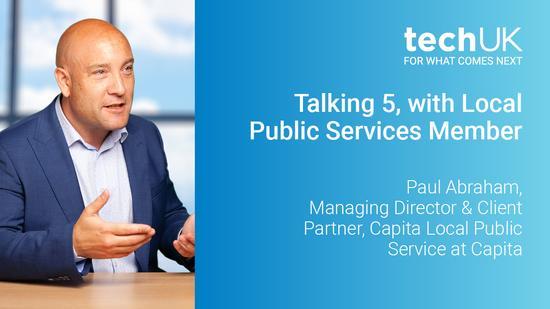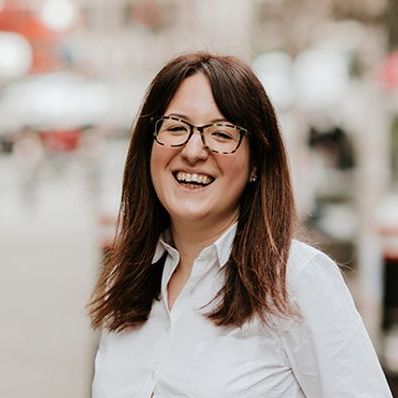Talking 5 with Local Public Services Member Capita

techUK's Local Public Services Programme is delighted to be launching a new member spotlight series ‘Talking 5’, where head of programme Georgina Maratheftis interviews a member active in the local government space about their vision of the future of local public services and where digital can make a real difference to people and places.
We are delighted to have Paul Abraham, Managing Director & Client Partner - Capita Local Public Service at Capita as our first guest in this new series. We talk all things place based and what that means for the future of local public services.
Georgina: Thanks for being our first guest in this new series Paul. Firstly, tell me more about you, your career and how you got to this position today?
Paul: I went to university and did a master’s degree in English literature and was thinking about a career in academia but was then really attracted to joining the Metropolitan Police. I worked on the frontline for two-years but, like many others, teachers, nurses and social workers, I found that I spent much of my time doing paperwork rather than working with people. I was fortunate to get a position with Hertfordshire Constabulary as support staff which set the direction of my whole career, which has been about improving public service and resolving some of those frustrations I felt as a police officer wanting to spend more time serving others and less on admin. I spent 5 years there managing performance and transformation programmes and then got seconded to Her Majesty's Inspectorate of Constabulary. From there I went to a big national provider of housing leading transformation and customer services.
I then went to work for Essex County Council and did two or three roles with them. One of the wonderful things about local government is the opportunity it gives you to move into different areas. My passion for improving public services and my experience led me to a role in children services for about three years. I was part of the leadership team there that transformed it from special measures to ‘good’, which was amazing. I went on to a role leading transformation for the whole of the council and finished up as the transformation HR director. I was very happy at the council and hadn’t through of moving across to industry until approached by Capita. We had a third generation outsourcing arrangement with Capita and having seen it from the client side, I knew how Capita worked. One of the things that appealed to me was the idea that I could still focus on delivering public sector outcomes but with the pace and innovation you often see in the private sector. I've been here for five years now and every year I've taken on more and more responsibility and this year I was lucky enough to be appointed as managing director and client partner for the whole of our local public service business.
Georgina: Congratulations on the new role Paul! Great to hear how you passion for local public services has been firmly rooted from day one as a police officer. As someone who has worked in local government and now works closely with them, what do you see as the main challenges facing local government?
Paul: The first one probably won't come as a surprise to anybody which is funding. When I was working for Essex County Council, we were trying to save something like £250 million over 3 years when demand was still increasing, and government funding was reducing. Over the last 18 months, funding pressure has become more pronounced than ever as we have seen councils’ revenue reduce due to lockdown, from parking revenue to collection of business rates.
Through the pandemic the spend for adult social care and health has only increased, but funding hasn't gone up, so it's almost created a perfect storm for authorities now who are desperately looking at different ways to work - whether that's structural reform, how they work together, or reenergising their transformation. The other key challenge, probably linked to that, but much more in the place-based front, is economic regeneration. As peoples working patterns change the hubs where people were based before differ. It gives lots of opportunities for authorities to redefine what their place is and interrogate what it stands for, and how all the different organisations that support that place come together to support residents, communities and businesses. There's a challenge there, but also a real opportunity.
Georgina: What role can digital play in solving some of the most pressing challenges our local public services and places face?
As the saying goes, necessity is the mother of invention and I think local authorities have probably moved forward more in the last 12 months than they have in the last 10 years - because they've had to. One of the key challenges is around data, identifying vulnerable people who were shielding but doing that in a way that could be shared between organisations. I've seen a lot of authorities do things like use the unique property reference number from their housing service and then build on top of that data about health deprivation economics. It’s one of those challenges that the sector has tried to crack for years and years. How do we build data around a citizen or around the community so that we can target services in the most effective way? COVID-19 has sped up progress and made organisations work together to share that data. We now have single datasets in many places, that are for a specific purpose. We can now build on these to inform things like the joint strategic needs assessment and how we plan services for that population going forward. The next step is working with technology providers to understand how authorities can automate a lot of that data.
Another opportunity is how citizens engage with council services. Again, a lot of authorities have struggled over the years to channel shift, moving residents to interacting either with the website or to transact in simpler ways. The goal, to focus on human interaction with vulnerable people and those with complex needs, those that really need a person to talk to. But actually, managing that channel shift has been a real problem. It's not just about making sure the technologies in place, it's about making sure that we change human behaviour as well and provide a wide range of channels that suit citizens, whether that be web, text, conversational IVR, Messenger etc.
The final opportunity that we don't talk about a huge amount, probably because it is such a significant challenge, is how do we restructure local public services, like councils, to be more productive and deliver better citizen experiences. What does this mean for officers? What new skills will be needed? How do we fund the much needed transformation within local government when funding is already beyond tight?
Georgina: It has been a year of change. How do we now maintain the pace of innovation we've seen, and what role can suppliers play in this?
Paul: The sector has been working at a tremendous pace for the last 18 months and people are burned out. Local public service providers need time to pause and think. It is important that we, as a sector, don’t revert to old patterns of delivery. Local authorities are central to place based services, they interact with other agencies like education, like health, like criminal justice and one of the real opportunities we've got now is for those agencies to come together and come up with a really clear vision for their place. If we can learn from the last year and a half and have that clear vision for place, it gives everybody something to aim for.
There's a real opportunity to start working smarter rather than harder. A lot of what we have done through the last 18 months has been for the first time. We've built new systems, we've put in place new ways of working. I think now is the time to take a bit of a step back and see how we optimise those. How do we use different ways of resolving problems? What technology can we use to actually help solve those problems? We need to make the most of the skills and passion we have in our front line and back office colleagues by using technology to free up their time so they can be deployed to best effect. We need to combine the technical expertise of suppliers with the deep local knowledge of councils and the third sector.
At Capita we have recognised that our customers in local public services need something different and made some significant changes to how we are structured, refocused on technology and bought our public-facing technology, software and sector operational teams into a single division. This will provide customers with a much more agile and nimble service, able to quickly respond to changing needs of citizens and those who serve them.
Georgina: As councils plan for recovery, reflect and rethink the future of local public services, what is your vision of the council of the future?
Well, I think you kind of touched on in the in the phrase ‘local public services’. My vision for the public sector has always been that the focus on outcomes drives organisations together. Whether it's data sharing or whether it's joining services together, or whether it's joining the delivery together into community-based teams or joining accommodation together so that things are co-located.
The future of local public services is one of integration and services coming together to deliver better outcomes for people rather than looking at services in isolation. Local authorities have and always will be absolutely central to that.


